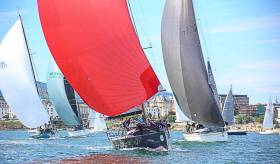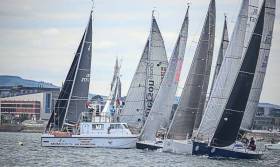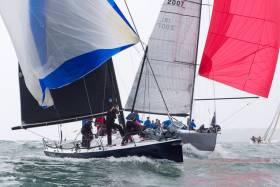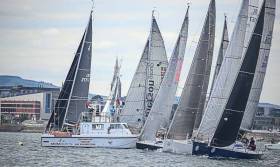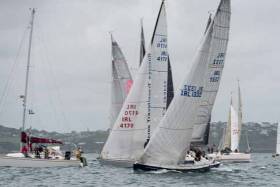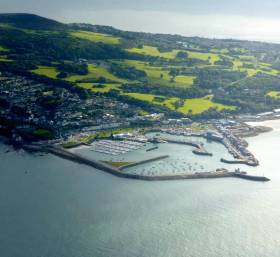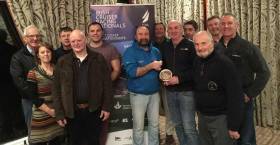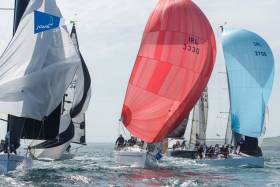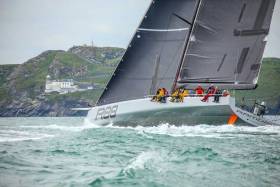Displaying items by tag: ICRA
RORC Says IRC Certificates Show Positive Start for 2018: Irish Take Up 'Same as Last Year'
The International Rating Certificate (IRC) has made a flying start to 2018 with increased numbers of rating applications in the first month of the year and nearly 1000 certificates issued in January. RORC says 'This is very positive for IRC as certificates are not automatically renewed. Owners must apply for a new certificate through their local IRC Rule Authority and advise any changes to the boat’s configuration before the certificate is issued by the RORC Rating Office or UNCL Centre de Calcul, joint owners and administrators of IRC'.
In Ireland, Irish Sailing says they have have had 50 IRC revalidation applications plus four trial cert applications so far this season. According to Chief Executive Harry Hermon, this is trending 'exactly the same as last year'.
2017 saw total Irish certs of 419 (includes all applications – revalidation, new, trial, amendment etc) so the view is that this will be the same in 2018, with a 'possible small increase'.
March/April/May/June are the peak months for IRC applications in Ireland.
Changes to the IRC rating calculations are implemented every January to cater for technical innovations in yacht design, a practice implemented by the IRC Technical Committee to foster close racing and protect the main fleet while remaining progressive.
Over the last 12 months the Technical Committee has been studying the effects of foils and how they are rated. Boats such as Infiniti 46 Maverick using the Dynamic Stability System will see a change in her rating from which she will benefit for the upcoming RORC Caribbean 600. Other developments for Spinlock IRC 2018 include changes to the calculations affecting: the rating of spinnaker area, sports boats, and boats that set headsails from bowsprits and do not carry spinnakers.
The ‘dayboat’ classification has also been removed from the Rule, leaving assessment of boats’ Offshore Special Regulations compliance to event organisers.
Difficult Times Continue for ICRA – Commodore Calls for Respect Amidst Internal Dissension
“These are difficult times for the Association. While robust debate is welcome and encouraged, respect for all must remain in all of our dealings with each other,” the Commodore of the Irish Cruiser Racing Association, Simon McGibney, has said, in the midst of what has been described by other members as “a deep division” developing.
The Irish Cruiser Racing Association website has published the Notice of Race for the ICRA National Championships to be held in Galway Bay from August 16 to 18 and urges owners to REGISTER NOW. The notice includes the WIORA, West of Ireland Racing Association, West Coast Championships from August 15th to 17th.There is a strong list of sponsors, headed by Galway Port and both events will be run, the Notice says, in conjunction with Galway Bay Sailing Club. There is an offer of a reduced “early bird entry fee” and the Latest News Updates on the site declare that the Championships ARE A GO! And that “top-notch preparations are well underway…”
Perhaps, understandably, there is no word on the website about the dissension within the ranks of ICRA about the choice of Galway, nor that the disagreement has developed into wrangling between different members of the ICRA Executive and some outrage over comments made by one officer that the dispute within ICRA’s ranks was “a naked attempt to browbeat and intimidate officers in an effort to take over the Association by a small group…”
The Commodore of ICRA Simon McGibney called for an emergency meeting and indicated there would be a statement following that.
What appears to have happened, I have been told, is that “an attitude of aggression developed within ICRA” and that a number of members felt it was losing its way, there was concern expressed from some quarters that there was too much “fragmentation”, others that the Association had changed too much from a “fun organisation.. with a welcome into every club” into a bureaucratic, complicated structure.
While the source of disagreement appeared to arise from the choice of Galway for this year’s National Championships and an ICRA survey which showed a lack of support, sources have told me that there is more to the disagreement than just that….
Former Commodore, Norbert Reilly, whose resignation and comments that the Association may have reached its sell-by date, raised a lot of concern, had written to Executive members last June suggesting that everyone on the Executive would retire and hand-over to a new Committee. That didn’t receive much of a response and he resigned.
In the past few days I’ve been told that moves have been made to break the stand-off.
When ICRA was originally started I remember being told it would focus on national representation for boat owners, organising a national cruiser championship and getting an Irish team to win the Commodore’s Cup. All that has been achieved, so ICRA has been a success in that regard. But differences of opinion can emerge in a time of change. It is regrettable that this has led to some bitterness express in recent exchanges.
ICRA has been working on a five-year plan, but there is a view that a shorter-term approach is also needed.
At a time when it has been claimed, as in the annual report of the South Coast Offshore Racing Association, that interest in racing is increasing, the sport needs unity, not dissension at national organisational level.
• Listen to the Podcast below
What is to be the Future of the Irish Cruiser Racing Association?
After 16 years of progressive existence it needs to negotiate choppy waters.
The present Commodore, Simon McGibney, says that the Association is at the stage where it needs an “in-depth” look at its future.
Former Commodore Norbert Reilly, who has resigned from ICRA, said it has been “getting in the way of its own plan for the past two years” and that it is probably a good time to wind up ICRA…
Differences over genuinely held views do occur in organisations, with the best of intentions on both sides, but when the greatest loss can be for the future of the organisation, all racing sailors should be concerned.
The disagreement originally appeared to centre on the choice of Galway for the ICRA Nationals this year, but the underlying problems in ICRA are deeper than that and it is regrettable that Galway Bay Sailing should be the focus.
ICRA’S own unpublished survey reported warning signals about the Championships, with value for money down to 5.83 per cent. The Red C survey also said that “none of the sailors from Classes 0, 1, 2 or non-Spinnaker A said they would go to Galway. There was support in Class 3 and 4 and Corinthian B. August was identified as an issue for crews and the distance for boats to travel. “Galway is a lovely place but with the best will in the world I can't see myself making the trip. It's OK for boats that can be trailed but otherwise a stage too far….” summarised the opinion…
ICRA has been a strong source of development for committed racers and good for the sport, but there are others who would like to see ICRA spread itself wider and to encompass the ‘club sailor’ and to stimulate racing at this level. A revival of cruiser interest has been reported in some areas and stimulating the ‘club racers,’ encouraging young sailors to advance from dinghies into these cruisers could provide a system to supply crews, helms and owners to the more heavily-oriented racing boats in the future. The age profile of cruiser racing sailors has advanced so new ideas should be welcome.
The resignation of Norbert Reilly, who gave a lot of time to ICRA, is regrettable. Perhaps there can be a positive development. The postponement of the scheduled ICRA annual meeting until the Autumn and the production of a long-term plan could be a positive move, but it would be good for sailing to have wide involvement, including those who have disagreed with the Association, in the preparation of that plan.
• Listen to the Podcast below
ICRA Strategic Workshop Charts The Way for Five Year Plan; Conference Postponed 'Til Autumn
The Irish Cruiser Racing Association (ICRA) has postponed next month's annual conference until the Autumn. It follows 'strong representations' about its timing aired at this month's symposium in Limerick. The goal now, according to the ICRA executive, is to have 'a fully thought out set of proposals' prepared for the Autumn.
Positive outcomes from the work shop aim to map a five–year–plan but at the same time resignation of a board member over a 'controversial decision' to stage the national championships in Galway has meant choppy waters for the voluntary body.
ICRA has been in existence now for 16 years and has organised 16 national championships and annual conferences in that time.
In addition, ICRA has been developing a training and development role for cruiser racing in recent years. ICRA is recognised by Irish Sailing [IS, formerly ISA] as the national body to perform these tasks.
According to Commodore Simon McGibney, 'ICRA is now at the point where it feels the need to take an 'in depth look at its role' in the future'.
Outcomes documented at January's strategic workshop include the first steps 'to enable the production of an ICRA Strategic Plan'.
A draft document released from the workshop last Friday says: 'The focus will be will to ensure that there is a shared understanding of the environment in which ICRA operates, the strengths and weaknesses of the organisation, the relationship with key stakeholders, shared Vision and Mission before moving into strategic goals and strategies.’The working document also sets some strategic goals:
- Continue to Hold a First Class Nationals
- Continue to improve high standards
- Improve social aspects of events
- Create a National Training Programme for Cruiser Racing Sailors
- Increase Participation in Cruiser Racing
- Improve Communication
- Improve ICRA Governance
Don't Mention Handicaps as IRC Changes Rules & Deletes Dayboats
The IRC Yearbook arrived in the post as I prepared to write this week’s Podcast. It is sent out together with your notice to renew your Handicap for the season ahead. Only, ‘oops’, the word ‘Handicap’ is no longer acceptable.
Peter Wykeham-Martin, Chairman of the IRC Congress, writes an editorial in the yearbook where he asks all IRC Certificate holders, or as it has been called for many years, a ‘Handicap’ to “please don’t use the word ‘handicap’ when talking about IRC.”
“Handicaps,” he says, “are what you bet on in horse racing and include a jockey’s form.”
“Rating,” Peter declares, “is what we use in IRC to assess a boat’s potential performance – the ability, or lack of ability of the helmsman and crew is not included.”
Is Chairman Wykeham-Martin writing with ‘tongue-in-cheek’ or is he having a ‘dig’ at ECHO ‘handicap’ system – Oops - there’s that word again?
He’ll have a bit of a job to eradicate the description ‘handicap’ from racing, but maybe the desire to do so is part of the changes which are announced in IRC in the very first page of the Yearbook. There are seven Rule Changes listed, plus ‘Definitions’ and other changes.
Amongst them the ‘default’ values for mainsail widths have been deleted, as this was considered inconsistent with the Rule on Headsails.
One of the more fundamental changes in the Rules is the deletion of the ‘Dayboat Definition and Rule 24.’ IRC and its predecessor CHS - remember that ‘handicap system’ –had defined a Dayboat as one which could not comply with Offshore Special Regulations and so Rule 24 stipulated a minimum self-righting angle and items that IRC-rated or ‘handicapped’ depending upon your regard for words and the Chairman’s view, should carry. In quite a few instances ‘Dayboat’ definition seemed to have a relevance to lifelines and, so could refer to boats from 1720s to J Class Yachts.
If you are an IRC holder, look it all up in the yearbook, but don’t mention the word ‘handicap’ if you want to ‘rate’ with the IRC afficionados!
Listen to the Podcast here.
ICRA Workshop to Shape Future of Irish Cruiser–Racing Body
The Irish Cruiser Racing Association (ICRA) is running a workshop to examine the future role of ICRA this month.
ICRA has issued an invitation to clubs and individuals that are key to the development of cruiser racing with a view to develop a plan to chart the way forward for ICRA.
ICRA has been in existence now for 16 years and has organised 16 national championships and annual conferences in that time.
In addition ICRA has been developing a training and development role for cruiser racing in recent years. ICRA is recognised by Irish Sailing [IS, formerly ISA] as the national body to perform these tasks.
ICRA is now at the point where it feels the need to take an 'in depth look at its role' in the future.
Following this workshop a draft plan will be prepared and circulated with a view to being approved at the ICRA annual conference on Saturday, 24th February, 2018.
The meeting will take the form of a brainstorming session led by Steve Griffiths of gcass, who is a former Strategy Development manager with World Rugby and Head of Organisation Development with that body over an eighteen year period.
Howth Yacht Club's 'New Wave Regatta' a Dynamic Mix of Old and New
A successful new development in the national sailing programme will inevitably be something of a revolution. Yet if those managing the event handle it in the right way, the changeover can take place without people thinking that anything really revolutionary – in the sense of a sudden and complete change – has taken place. W M Nixon takes a look at the successful unveiling of the new-style Wave Regatta planned for his home port of Howth for next year’s June Bank Holiday Weekend.
Preparation is everything. Quiet work behind the scenes in trying to visualize every practical and administrative glitch which might arise, and how best to deal with it well before it becomes a problem, is essential. Getting key people – decision-makers and can-do people, local, regional and national – firmly on side, is absolutely essential.
Testing the waters of consumer opinion with trial announcements and proposals, and the occasional test run maybe disguised as something else, is also part of the process. Yet revealing too much of what is taking shape before it is really ready to go public can do more harm than good.
Thus when Howth Yacht Club’s Wave Regatta 2018 was unveiled after a crisp and businesslike Annual General Meeting in the clubhouse on Thursday night, not only was it a very complete and appealing concept in itself, but it emerged fully formed, and in a style well presented to an audience filled with fresh enthusiasm.
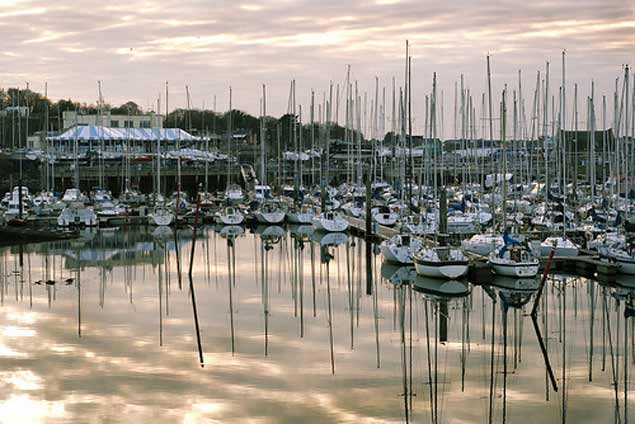 Howth’s modern marina/clubhouse complex (above) is in stark contrast to the situation pre-1987 (below) when the ISORA racers and the fishing fleet had to share the same small space. The boat at centre is the famous S&S-designed Sunstone (Tom & Vicky Jackson) which in her racing days with ISORA was known as Dai Mouse III.
Howth’s modern marina/clubhouse complex (above) is in stark contrast to the situation pre-1987 (below) when the ISORA racers and the fishing fleet had to share the same small space. The boat at centre is the famous S&S-designed Sunstone (Tom & Vicky Jackson) which in her racing days with ISORA was known as Dai Mouse III.
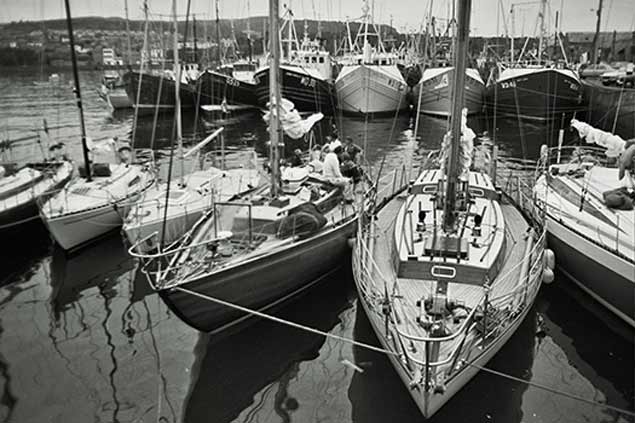
After all, Commodore Joe McPeake had just finished chairing an AGM whose mood was enthusiastic after the publication of a set of figures which showed that the huge extra voluntary effort and support which the club has received from many of its members during the past 18 months has paid real dividends. While the improving mood had become increasingly apparent as the season progressed, by Thursday night if you could somehow have linked it to the National Grid, you’d have lit the village with it.
Inevitably, Howth gets compared to the big southside clubs of Dun Laoghaire, and the way their huge reservoir of personnel resources - further augmented by the overall administration of Dublin Bay Sailing Club, and with the large marina run as a commercial venture – frees up a enormous pool of talent to keep a high-powered show on the road. For when all is said and done, only Dun Laoghaire - with its unique selection of stately shoreside facilities - could stage an event like the Volvo Dun Laoghaire Regatta.
But in Howth, the one club has to do everything. So instead of trying to rival Dun Laoghaire, today’s Howth sailors see their strength in being themselves in their own special peninsular port, which is neither Dublin nor northside nor remotely southside. On the contrary, it’s emphatically part of Fingal. And it’s indisputably Eastside. On top of all that, as its basic geology is twice as old as anywhere nearby, it is Ireland which is the add-on to Howth, rather than the other way round.
However, that’s not in anyone’s mind in Howth at all this weekend, as we realize the leap of the imagination which has transformed some long-established Howth events by combining them with new concepts, and then steering the whole package into a significant gap in the market which had been hidden there in plain sight for all to see.
For the overall shape of the 2018 National Sailing Programme is unusual. The biennial Volvo Round Ireland Race from Wicklow has been shifted to the last weekend of June, presumably because its time-honoured slot right on the mid-summer weekend around June 23rd would have clashed with the finish of the Volvo Ocean Race itself in The Hague at the same time.
So with the Volvo Round Ireland on June 30th, Volvo Cork Week in its turn was moved back to July 16th to 21st. And while those who seek a fun regatta with holiday overtones have Calves Week in Schull from August 7th to 10th, those in pursuit of racing with recognised national titles at the end of it have the ICRA Nationals at Galway from 15th to 18th August.
What it meant to those in Howth was that there wasn’t a major cruiser-racer championship on Ireland’s East Coast for the entire season, and particularly not in June and early July when the heavies generally expect an event of this type. But that realisation came after they’d already set in motion a project to re-invigorate their traditional Lambay Race, which has been staged annually since at least 1904 and maybe earlier.
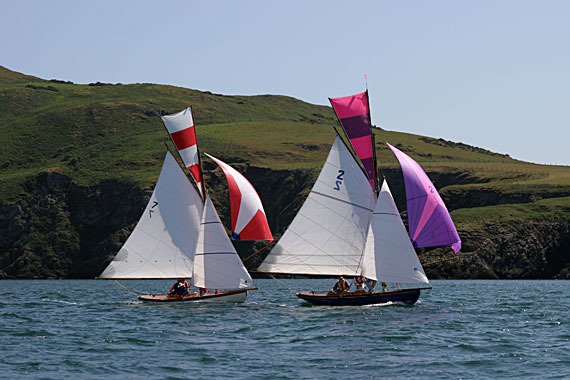 The classic Lambay Race. Howth 17s Aura and Pauline racing along the coastline of Ireland’s most unspoilt island. Photo John Deane
The classic Lambay Race. Howth 17s Aura and Pauline racing along the coastline of Ireland’s most unspoilt island. Photo John Deane
In times past, with smaller craft such as the 1898-established Howth 17s (happily still with us, and stronger as a class than ever), simply racing round the island of Lambay from Howth was enough for a long day’s race. But with newer and much bigger craft joining the mix, all sorts of ways had to be found to increase the length of the Lambay Race for the big boats, while retaining its character. Yet by this stage, the programme generally was becoming crowded, with the revival of ISORA posing new problems of rival events.
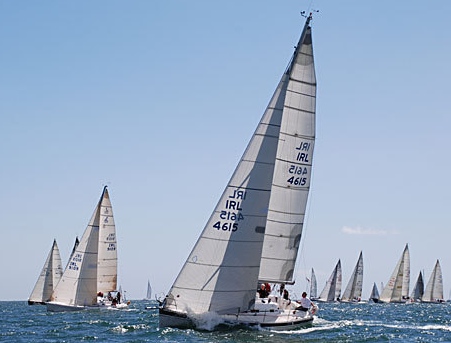 Cruiser-racers in the Lambay Race. Todays faster boats expect a longer race than the traditional 16-mile course
Cruiser-racers in the Lambay Race. Todays faster boats expect a longer race than the traditional 16-mile course
A partial solution was reached this year when the ever-obliging ISORA Chairman Peter Ryan agreed to incorporate the annual Lambay Race as the main section of an ISORA Race which would start with the Lambay fleet and sail through its course and finish line, but then race on to a finish in Dublin Bay to provide the kind of distance ISORA expects.
However, for 2018, the Lambay Race on Saturday June 2nd will be a fully-fledged ISORA event in its own right. But it will literally be a Lambay-Race-With-Knobs-On for the Cruiser-Racer classes, as the organisers are planning a morning start and probably taking in Rockabill and the Kish to provide a perfect miniature offshore course.
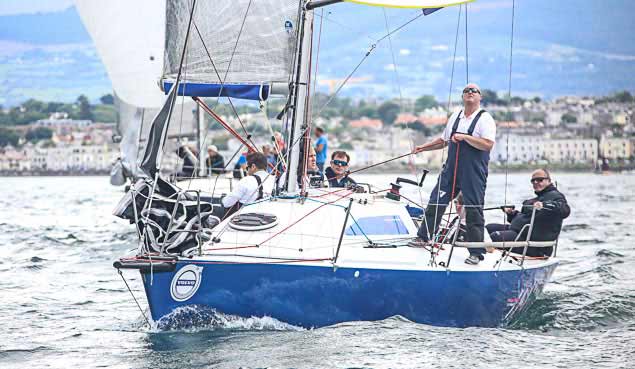 Dave Cullen, Director of Racing for the Wave Regatta, on the tiller of his classic Half Tonner Checkmate XV. Photo: Afloat.ie/David O’Brien
Dave Cullen, Director of Racing for the Wave Regatta, on the tiller of his classic Half Tonner Checkmate XV. Photo: Afloat.ie/David O’Brien
Having the full ISORA imprimatur on this extended Lambay Race provides the new Wave Regatta with the massive corner-stone which enables the Organising Committee, chaired by former HYC Commodore Brian Turvey, to build a full three-day programme around it, for they can be confident that local One Design Classes such as the Puppeteer 22s and the Howth 17s will already be doing the Lambay Race in its traditional form. As well, Sportsboat Classes like the SB20s and the 1720s will also have the option of a start. And if the IRC Class divisions are made in the right way, we’ll have the J/109s, the J/80s and the J/24s racing as classes-within-classes to add that bit of extra zing.
As the possibilities became clearer, one extra bit of information encouraged the Howth group to go for it big time in promoting an event with three days of solid racing as a viable biennial alternative to the Volvo Dun Laoghaire Regatta. This was the news that, in future, in every even year the annual ICRA Nationals will be staged at a non-Dublin venue – August’s Galway venue is the start of this process.
This meant that the Howth team really had to get their skates on in order to have a realistic proposition and programme in place in time for an official unveiling at Thursday’s HYC AGM on December 14th. Even with test runs on various aspects of the main idea during the past couple of seasons, the actual countdown time was short enough, but by Thursday night such a complete package could be put on display that they were able to tell us that Fingal County Council were giving major support, there was every encouragement from the Harbour Authority, and HYC member Michael Wright had come on to the Committee to act as shoreside hospitality director, while also bringing in the support of his Wright Hospitality Group.
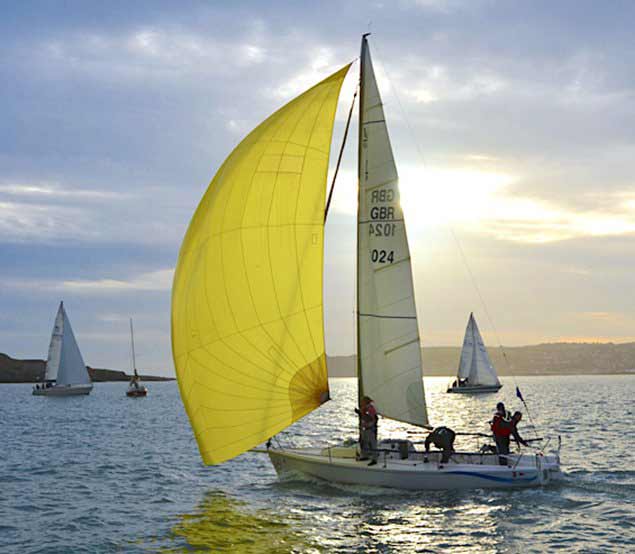 One of HYC’s club-owned J/80s in Howth Sound. With an additional club-owned flotilla from the Royal St George YC, the IRC-compliant J/80s will have a choice of options for Wave Regatta
One of HYC’s club-owned J/80s in Howth Sound. With an additional club-owned flotilla from the Royal St George YC, the IRC-compliant J/80s will have a choice of options for Wave Regatta
In fact, these days with its proliferation of characterful restaurants and hospitality hotspots, Howth’s shoreside entertainment is soon in place. So it’s the programme afloat which has to match it, and here the organisers have hit the target by having Irish Sailing President Jack Roy take on the role as one of the senior Race Officers, another being former President David Lovegrove. Howth-based Race Officers such as David Lovegrove and Harry Gallagher have long made a major input into Volvo Dun Laoghaire Regatta, so all these top men afloat are accustomed to working with each other in the most demanding situations.
They’re also accustomed to inter-acting with the “customers” after racing, and it was their reports of overseas visitors to the Dun Laoghaire Regatta expressing a wish to take part in some sort of major event in the Greater Dublin area every year which encouraged the Howth team to think that, with proper planning, they could provide an alternate biennial regatta which would be different from Dun Laoghaire, yet express the same mood of good but not too serious sport afloat, and high-powered entertainment ashore, with an emphasis on attracting younger participants.
 Irish Sailing President Jack Roy will be a Race Officer at Howth’s new event
Irish Sailing President Jack Roy will be a Race Officer at Howth’s new event
Flexibility is the approach. For those who wish to do just the Lambay Race on the Saturday, that’s fine. But for those who want the Full Irish of a really good programme of sport, there’ll be three races on Friday 1st June, and three more on Sunday June 3rd, while the Bank Holiday Monday will be given over to a Family Day which was very popular in 2017, and will be further developed next year.
As with everything to do with sailing in Ireland, the weather factor will be considerable. But for those of us who have done more than a few Lambay Races, the good memories linger best, and they’re of an effortless regatta atmosphere with an element of local pride, for it’s the coast of Fingal we’ve been racing along, one of all Ireland’s finest islands we’ve been racing round, and it’s our own home port under the hill that we’ve raced home to.
Which makes it fine for those who live locally. But the Wave Regatta Committee, in which Dave Cullen plays a key role as one of the leading ideas experts while officially he’s called Director of Racing, realise that the fact of Howth being on a peninsula and the village being largely residential, with a shortage of hotel bedrooms, can provide a challenge for those who live elsewhere, but want to keep their boats race-ready rather than as floating caravans.
So HYC have hired 30 campervans which will be available for rent in the car-park beside the club, and as well local sailors have made it clear they’ll be more than hospitable in providing accommodation. As for the problem of the DART from Dun Laoghaire not starting until late on a Sunday morning, they’ve swung a deal with Dublin Bay Cruises whereby the familiar blue-hulled St Brigid will depart her berth in Dun Laoghaire at 08:15 Sunday morning, bound for Howth and the final day of racing.
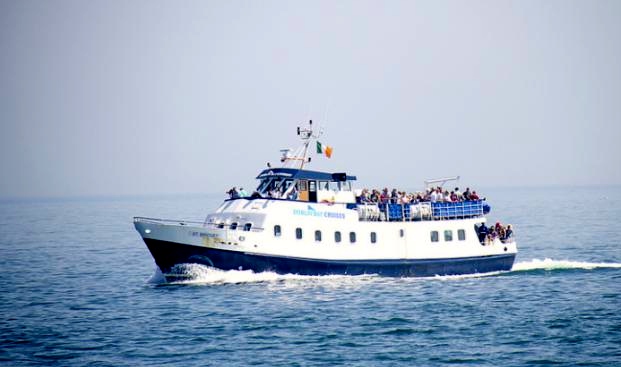 The Dublin Bay Cruise vessel St Brigid will run a ferry service from Dun Laoghaire to Howth on the Sunday morning
The Dublin Bay Cruise vessel St Brigid will run a ferry service from Dun Laoghaire to Howth on the Sunday morning
It’s that sort of off-the-wall yet actually very sound idea which gives us some idea of the thought which is going into this new Wave Regatta at Howth. You can do a lot of sailing in three days if everything is in place, and this team is determined that it will be.
Meanwhile, let’s hear it for the home squad, the new HYC Club Officers who were elected on Thursday night, and will have their agenda will filled throughout their time in office, as plans for 2018 include the establishment of a fully-fledged Sailing School within the club. They are: Commodore: Joe McPeake; Vice Commodore: Ian Byrne; Rear Commodore: Paddy Judge; Rear Commodore: Ian Malcolm; Hon. Secretary: Bernie Condy; Hon. Sailing Secretary: Caroline Koster; Honorary Treasurer: David Mulligan.
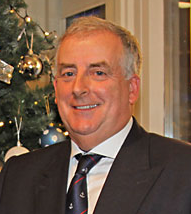 HYC Commodore Joe McPeake
HYC Commodore Joe McPeake
WIORA Votes to Suspend Membership Fees for 2018
The Annual General Meeting of the 2017 West of Ireland Offshore Racing Association (WIORA) took place at the Dromoland Inn in Co. Clare earlier this week. Among the items discussed on the night was the combined 2018 WIORA ICRA Championships which will be run in Galway Bay next August. In acknowledging that combining events can mean an increase in costs to boat owners and participants, and as a gesture of goodwill and thanks to its members for their continued support, WIORA have voted to suspend membership fees for 2018. The venue for the 2019 West Coast Championships was also decided at the AGM with Foynes Yacht Club being awarded the event.
After twelve years in his role as Honorary Secretary of the Association, Thomas Whelan from the Royal Western Yacht Club of Ireland, stepped down at the AGM. WIORA Commodore, Simon McGibney, the WIORA committee and its members would like to sincerely thank Thomas for all his years of service and contribution to promoting cruiser racing along the west coast and wish him the very best of luck with his new found free time next year.
SCORA Prizes To Be Awarded Tonight at Royal Cork Yacht Club
Connor Phelan's Jump juice will be among the winners saluted tonight at the South Coast Offshore Racing Association (SCORA) agm and prizegiving that will be held in the Royal Cork Yacht Club at 7.45pm writes Bob Bateman.
Cruiser–racer fortunes are on the up in Cork harbour according to SCORA Commodore Kieran O'Connell who gave a recent confident forecast that fleet numbers are on the 'way back'.
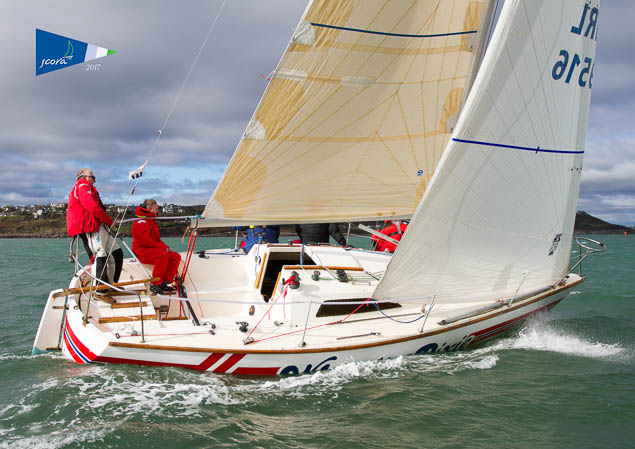 Tom McCarthy's Whistling Dixie was third in ECHO White Sails division. Photo: Bob Bateman
Tom McCarthy's Whistling Dixie was third in ECHO White Sails division. Photo: Bob Bateman
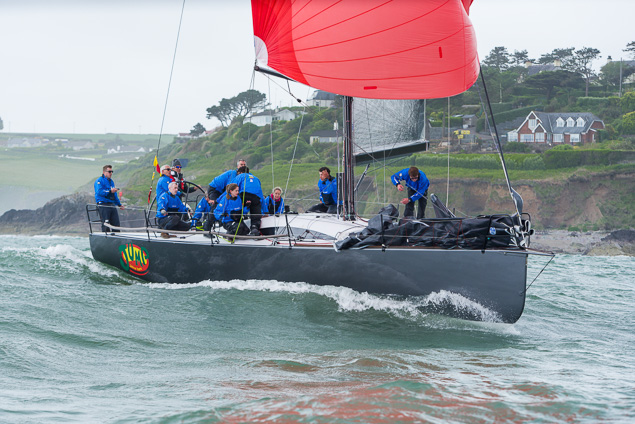 Conor Phelan's Jump juice is among the winners at SCORA tonight Photo: Bob Bateman
Conor Phelan's Jump juice is among the winners at SCORA tonight Photo: Bob Bateman
As well as Phelan's Class Zero and One victory, among tonight's other highlights is Tom Roche's first in ECHO in the same division with Kinsale Yacht Club entry Meridian.
RCYC entry Bad Company (Desmond, Ivers) was the IRC two winner with Waterford Harbour yacht Slack Alice skippered by Shane Statham second.
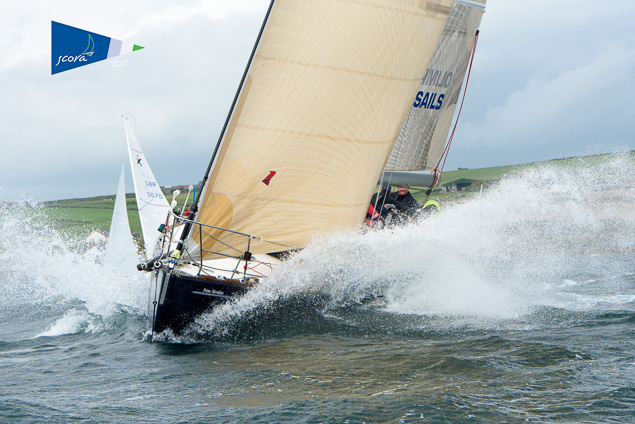 Kinsale Yacht Club entry Meridian (Tom Roche) Photo: Bob Bateman
Kinsale Yacht Club entry Meridian (Tom Roche) Photo: Bob Bateman
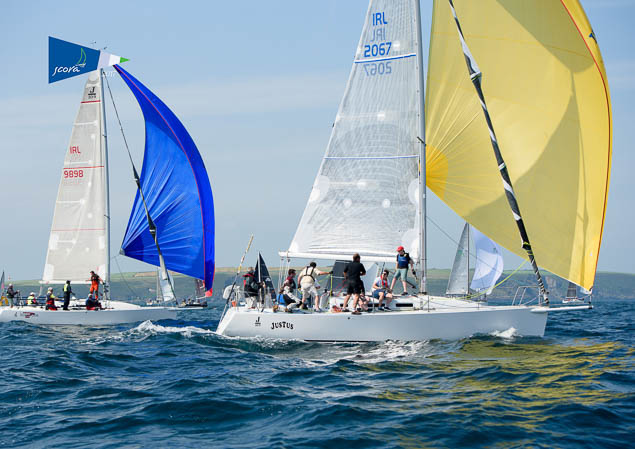 Dan Buckley's Justus (yellow spinnaker) was third in IRC Zero Photo: Bob Bateman
Dan Buckley's Justus (yellow spinnaker) was third in IRC Zero Photo: Bob Bateman
A full list of prizewinners are below.
Among the matters for discussion at tonight' meeting will be the perennial question of Class Bands for handicapping. This is because the IRC certs change and consequently bands need updating on a regular basis.
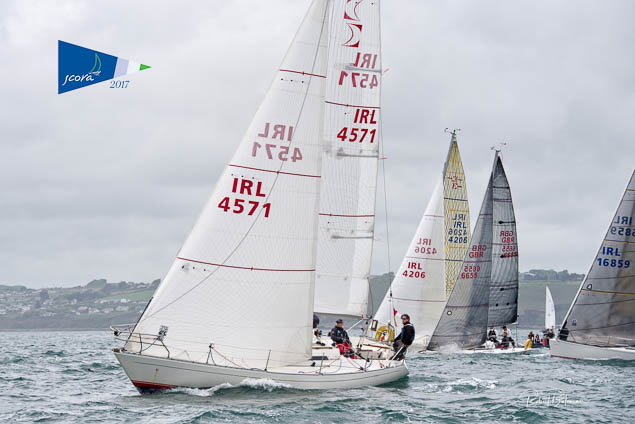 Waterford Harbour Sailing Club's Flyover, a Sigma 33, skippered by David Marchant was the IRC 3 winner Photo: Bob Bateman
Waterford Harbour Sailing Club's Flyover, a Sigma 33, skippered by David Marchant was the IRC 3 winner Photo: Bob Bateman
Agenda
1. Finance
2. SCORA Leagues
3. Combine club league in Cork
4. Class handicap bands for 2018
5. ICRA Training Grants
6. ICRA Crew Point
7. AOB
8. Prize Giving
List of 2017 prizewinners: Scora league
Jump juice Connor Phelan 1st IRC 0/1 2nd Echo
Meridian Tom Roche 1st Echo 0/1 2rd Echo
Justus Dan Buckley 3rd IRC 0/1 3rd Echo
Slack Alice Shane Statham 2nd IRC 2 3rd Echo
Bad Company Desmond,Ivers 1st IRC 2 2nd Echo
Artful Dodger Finbarr O Regan 1st Echo 2 3rd IRC
Cracker Denis Byrne 3rd Echo 3
Ye Gotta Wanna Dave Lane and Sinead Enright 3rd IRC 3
No Gnomes Leonard Donnery 2nd IRC 3 2nd Echo
Flyover David Marchant 1st IRC 3 1st Echo
Nieulargo Denis Murphy 1st IRC W/S 1 2nd Echo
Indulgence Aidan Heffernan 1st Echo W/S 1 2nd IRC
Magnet Kieran O Brien 3rd IRC W/S 1 3rd Echo
Prometheus Paul Murray 1st IRC W/S 2
Bandit Richard Leonard 2nd IRC W/S 2 2nd Echo
Whistling Dixie Tom Mc Carthy 3rd Echo W/S 2
Aramis Pat Vaughan 1st Echo W/S 2 2nd IRC
Scora Cork Harbour league
Alpacca Paul Tingle 1st all in IRC
No Gnomes Leonard Donnery 1st all in Echo
Indulgance Aidan Heffernan 1st W/S IRC
Sea Dragon Frank Caul 1st W/S Echo
2018 – Will This Be Irish Sailing’s 'Year of Years'?
At least two different viewpoints may be taken on the remarkable and very long history of sailing in Ireland. Either you see it as a wonderful heritage, which should be celebrated with gala anniversaries, and whatever you’re having yourself, at every possible opportunity. Or else you might sadly admit that it’s a burden, a deadening load on all of us which stultifies development, restricts fresh thinking, and railroads the annual programme into a traditional pattern sailed in vintage boats which allows very little space for something with the instant appeal and intrinsic excitement of novelty.
But perhaps there’s a happy place somewhere in between, a thoughtful place among many events, where we can live comfortably with some astonishingly old throwbacks to the distant past, yet continue to modify the programme and our way of doing things in order to accommodate new ideas. And with any luck, we might somehow find space to come up with some bright ideas of our own to add to the rich and very varied tapestry of the world sailing scene. W M Nixon casts an eye over next season’s programme to see what it might bring to the party.
After the excitement of Annalise’s Silver Medal in Rio on August 2016, in 2017 there was a generally unstated but definite feeling that we were due a down-home year, a year when sailing in Ireland in all its quirkiness would be celebrated, and anything with a non-Olympic flavour would be given every encouragement to flourish.
Yet at the beginning of 2017, who could have predicted that as summer approached, it would be Annalise herself who would up-sticks from the pre-ordained Olympian way of doing things, and plunge into the maelstrom which is Volvo Ocean Racing?
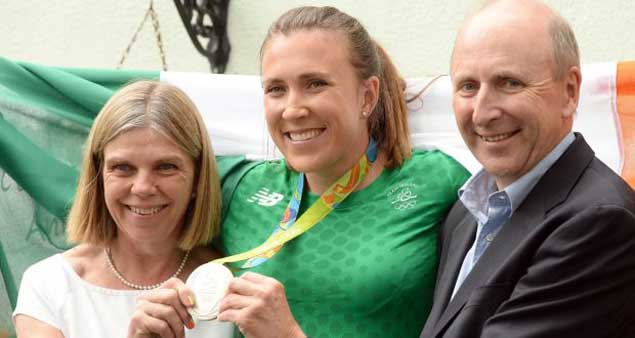 Olympic Medallist Annalise Murphy with her parents Cathy MacAleavey and Con Murphy. As the establishers of a long-standing Round Ireland Record in 1993, Cathy and Con are well aware of what Annalise has faced in taking on a round-the-world crewing job in the Volvo 65 Turn the Tide on Plastic (below)
Olympic Medallist Annalise Murphy with her parents Cathy MacAleavey and Con Murphy. As the establishers of a long-standing Round Ireland Record in 1993, Cathy and Con are well aware of what Annalise has faced in taking on a round-the-world crewing job in the Volvo 65 Turn the Tide on Plastic (below)
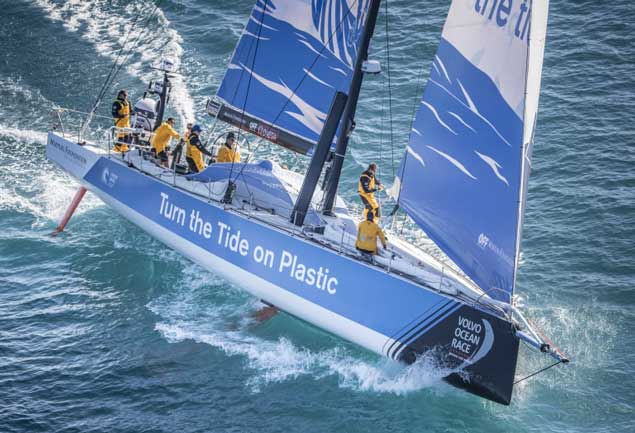
Successful predicting doesn’t get any easier, even with detailed programes taking shape. Annalise’s progress in the rugged ocean racing world this will be continuing until the finish in June 2018, but thanks to the Volvo Race’s flexible approach to crewing arrangements, she will be able to opt out for long enough to get herself back into the Olympic Women’s Radial Laser mode from time to time to keep in touch for the big Tokyo 2020 Olympics countdown event in early August 2018, the two-week Hempel World Sailing Championship at Aarhus in Denmark.
There, with 40% of places up for grabs, many other Irish Olympic wannabees will be progressing after long and often lonely months and even years of doing the circuit. By then, several of them such as Aoife Hopkins will have thoroughly tested the waters in the Olympic Classes, starting with the Championships in Florida in January.
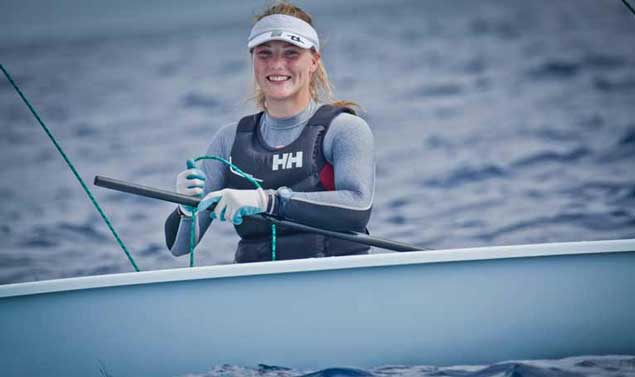 Aoife Hopkins of Howth and Trinity College will be starting her 2018 campaign towards the 2020 Tokyo Olympics in Florida in January
Aoife Hopkins of Howth and Trinity College will be starting her 2018 campaign towards the 2020 Tokyo Olympics in Florida in January
February sees action at home and abroad with the growing enthusiasm for Team Racing in action with the Trinity Varsities up on the lake at Blessington on Friday 9th/Saturday 10th February, which will fit them neatly around the Irish Sailing/Afloat.ie “Sailor of the Year 2017” awards ceremony back down in Dublin at the RDS on the evening of Friday February 9th, where an exceptionally eclectic group of maritime high-flyers will gather to receive well-deserved praise for many remarkable - indeed, in some cases astonishing - achievements.
But late February will also see serious international racing on the other side of the Atlantic with the increasingly popular annual RORC Caribbean 600 starting from Antigua on Monday 19th February. There’ll be a strong Irish contingent, and we have form here, as Adrian Lee’s Cookson 50 Lee Overlay Partners from Dun Laoghaire won the first Caribbean 600 in 2009, then Conor Fogerty’s Sunfast 3600 Bam! from Howth won her class in 2016, and in 2017 it was all back on top again, as the overall winner, Hap Fauth’s Maxi72 Belle Mente, was navigated by our own Ian Moore.
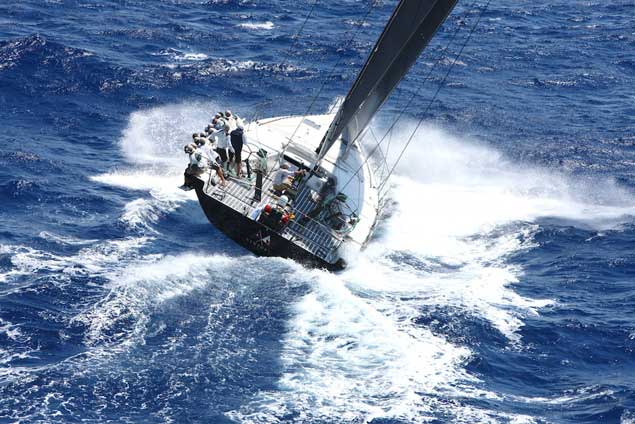 Bella Mente on her way to winning the RORC Caribbean 600 in February 2017, navigated by Ian Moore. There will be a strong Irish presence in 2018’s race, starting at Antigua on 19th February. Photo Tim Wright
Bella Mente on her way to winning the RORC Caribbean 600 in February 2017, navigated by Ian Moore. There will be a strong Irish presence in 2018’s race, starting at Antigua on 19th February. Photo Tim Wright
However, February at home in Ireland for most sailors is conference time, and the ever-expanding annual Irish sailing Cruising Conference is scheduled for Saturday February 17th at the Clayton Hotel in Leopardstown in Dublin, the move to a Clayton Hotel’s conference facilities having started last year in Cork when bookings were so heavy they’d to change the venue from the original choice of the Port of Cork HQ Building.
Nevertheless those dedicated team racers in school and college are also maximising their use of February before exam countdowns take over everyone’s timetable, and there’s the Leinster Schools at RStGYC on February 17th, while the following weekend is the big one, the Irish Universities Championship. In 2017 they had Clifden as a very successful venue in an early weekend in March, in 2018 they’re pushing the early season envelope even further by using the weekend of 22nd-24th February, and the venue is again in the west, this time at Kilrush, County Clare.
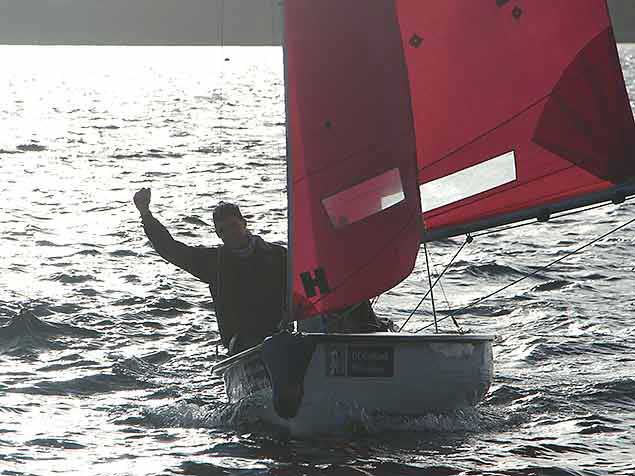 Springtime sunshine at Clifden in Connemara, March 2017, for the Irish Universities Championship. In 2018, the event will be even earlier – on February 24-25th at Kilrush in County Clare
Springtime sunshine at Clifden in Connemara, March 2017, for the Irish Universities Championship. In 2018, the event will be even earlier – on February 24-25th at Kilrush in County Clare
Thus we reach the end of February with the season already well under way for some specialists, but mainstream sailors will still be in a different time-scale, and in March the first one for the diary is Irish Sailing’s AGM on Saturday 10th March, venue still to be confirmed. However for those who insist that sailing shouldn’t miss any month of the Irish year, the Royal Cork’s famous come-all-ye dinghy festival, the PY1000, is slated in for Sunday March 11th, and it’s quite something, in fact it’s fantastic.
It would be impossible to imagine contemporary Irish sailing without the Laser, that ageless wonder which has contributed so much to our sport since it first appeared here around 1970. Yes, 1970. To be completely accurate, the Laser will be having its Golden Jubilee in 2019, as the prototpypes and first production boats sailed in 1969, so when our first major Laser event of 2018 gets going, the Munsters at Baltimore on March 31st/April 1st, it will be part of a growing celebration which in 2018 will culminate in Ireland in the mega-fleet World Lasers Masters (we’re talking maybe 400 boats) in Dun Laoghaire in a joint NYC/RStGYC venture from 7th to 17th September 2018. That will be a joyous affair to bring Dun Laoghaire Harbour to an upbeat mood as the traditional sailing season draws to its close after a fascinating main programme in the central part of the 2018 summer, with various pillar events the highlights in a continuous and colourful tapestry which takes in every part of the country.
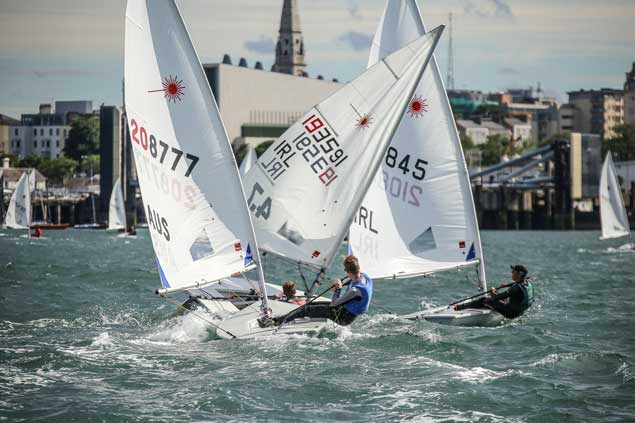 Lasers – it’s part of what we are. This classic dinghy is still as new as tomorrow, yet it’s now on the count-down to the Golden Jubilee in 2019-2020, and a significant part of that will be the World Laser Masters in Dun Laoghaire from 7th to 17th September 2018, with a huge fleet expected.
Lasers – it’s part of what we are. This classic dinghy is still as new as tomorrow, yet it’s now on the count-down to the Golden Jubilee in 2019-2020, and a significant part of that will be the World Laser Masters in Dun Laoghaire from 7th to 17th September 2018, with a huge fleet expected.
That “traditional season” will have seen solid regulars such as the annual programme of the steadily-expanding Irish Sea Offshore Racing Association into action by late April (first races are on April 21st), by which time the Irish Sailing’s Youth Pathway Nationals – 2017 was the biggest yet seen when it was at Ballyholme – will have been staged from 5th to 8th April at a venue yet to be confirmed. And Ireland’s long history of team racing will have been acknowledged yet again, this time with the 70th Anniversary of the senior of them all, the Royal St George series in Dun Laoghaire on April 22nd/23rd. Believe me, over those seventy years, just about everybody in Irish sailing seems to have been a participant in some way or other in this grandaddy of team events.
Into May, and the 12th to 18th sees the Asgard II Tall Ship Reunion Voyage in the Irish Sea on the Tall Ship Pelican, followed by a Gala Ball which will show that although the Asgard II was sadly lost ten years earlier in September 2008 when she sank, her spirit and those who sailed on her lives on, and an Irish tall Ship will sail again.
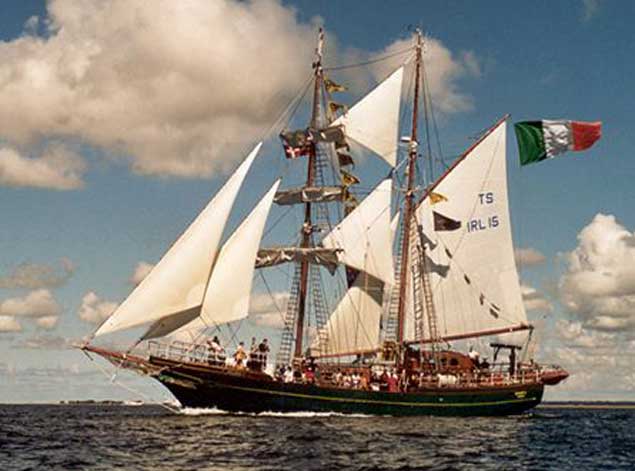 The much-lamented Sail Training Brigantine Asgard II was lost in September 2008, but the tenth anniversary of this sad event will see a renewal of the determination to find an appropriate replacement
The much-lamented Sail Training Brigantine Asgard II was lost in September 2008, but the tenth anniversary of this sad event will see a renewal of the determination to find an appropriate replacement
In May the core pace of mainstream sailing is hotting up, though while you might get sunshine, pure heat is still in short supply in Scotland in the Springtime with snow sometimes still on the mountain-tops for the Scottish Series at Tarbert in late May. But this has long been a happy hunting ground for Irish cruiser-racer crews, and we’ve no doubt the tradition will be maintained.
Meanwhile there’s more chance of a first hint of summer warmth away, far away to the southwest at Baltimore in County Cork where the steadily-growing Baltimore Wooden Boat Festival sees 2018’s staging from 25th to 27th May, and the whisper is there might be some unexpected and interesting visitors making their Baltimore debut.
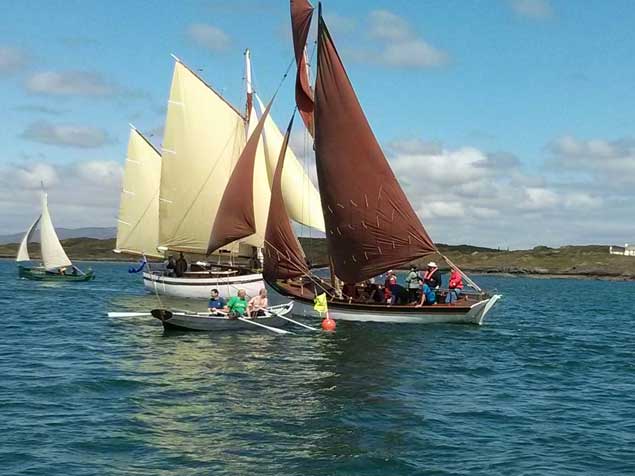 The Baltimore Woodenboat Festival in May definitely has something for everyone…
The Baltimore Woodenboat Festival in May definitely has something for everyone…
Back in the Irish Sea, the ingenious Peter Ryan of ISORA managed to devise a race in 2017 which somehow took in Howth YC’s time-honoured Lambay Race as the first part of the course. This will be repeated in 2018, helping to swell numbers in an event which, in the Bank Holiday Weekend of June 1st to 3rd 2018, will be part of Howth’s Regatta, the shoreside high point of which is a family day for the peninsula people which in 2017 was adjudged an outstanding success.
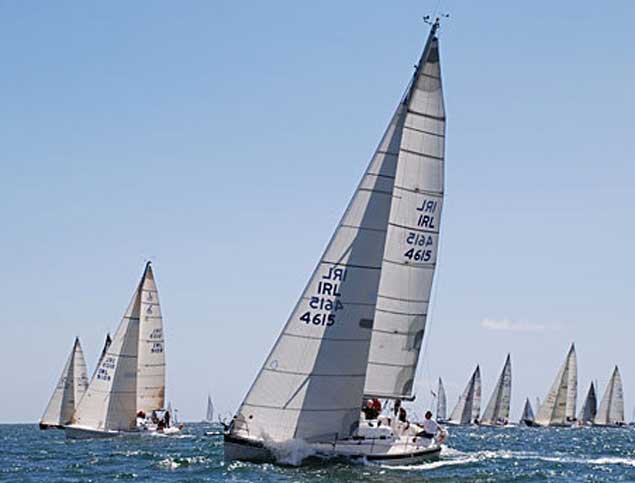 Summer comes to the East Coast - the Lambay Race at Howth, first sailed in 1904. 2018’s will be part of a family-friendly regatta at June’s Bank Holiday weekend, with the Lambay Race itself once again including the successful combination of the first part of an ISORA Race
Summer comes to the East Coast - the Lambay Race at Howth, first sailed in 1904. 2018’s will be part of a family-friendly regatta at June’s Bank Holiday weekend, with the Lambay Race itself once again including the successful combination of the first part of an ISORA Race
Because June’s Volvo Round Ireland Race from Wicklow has been moved from the traditional mid-summer weekend start to the last weekend of the month (presumably to avoid clashing with the finish of the Volvo Ocean Race itself at The Hague in The Netherlands where the stage is set from June 24th onwards), June is quite like old times with each Dun Laoghaire club staging its own Saturday regatta, while at national championship level the J/24s are descending on Foynes from June 8th to 10th, and the Sigma 33s are at the Royal St. George Yacht Club from June 22nd to 24th, while the National 18s in all their fascinating variations get in ahead of everyone with their Nationals at Baltimore on June 2nd/3rd.
Come the end of the month, and all eyes will be focused on Wicklow and the back-up port of Dun Laoghaire for the Volvo Round Ireland Race, counting 1.4 for the RORC points championship, and starting Saturday June 30th. It will be the 20th staging of this very special 704-mile Irish classic (it’s longer than either the Fastnet, the Middle Sea, the Bermuda, the Sydney-Hobart or the RORC Caribbean 600), but the 19th staging in 2016 was such a sensational event, with three MOD 70s and George David’s mighty Rambler 88 stealing the show, that 2018 is going to have to think of something different to make the proper impact.
In the end, its the steady, regular and frequent contenders who are the backbone of this race, and to emphasise this, the organisers are going to find which skipper has had the best accumulated result from the races of 2016, 2018, and 2020. Then at the prize giving after 2020’s race, that top scorer will be awarded a brand-new road-ready Volvo V40.
As to who will be doing the 2018 circuit, we do know already that the winner of the Volvo Dun Laoghaire-Dingle Race 2017, Paul O’Higgins (RIYC) with the JPK 10.80 Rockabill VI, has already signed up the formidable talents of Mark Mansfield of Cork who was on Dave Cullen’s chartered J/109 Euro Car Parks (aka Storm), which was the only Irish boat to win a class in the 2016 circuit.
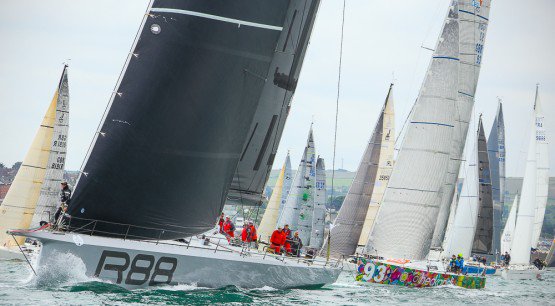 Here she comes….! How on earth George David’s Rambler 88 managed to come cleanly through the crowded start of the Volvo Round Ireland Race 2016 is a matter of wonder, but she did it like a hot and very swift knife through butter. Photo David O’Brien/Afloat.ie
Here she comes….! How on earth George David’s Rambler 88 managed to come cleanly through the crowded start of the Volvo Round Ireland Race 2016 is a matter of wonder, but she did it like a hot and very swift knife through butter. Photo David O’Brien/Afloat.ie
In July the emphasis moves emphatically to the south coast, and you can drive your new Volvo V40 there in expectation of a warm welcome, as the next big one up is Volvo Cork Week from July 16th to 21st. There’ll be an added sense of anticipation to this marvellous biennial sailfest, for it will be the last Cork Week before the big one in 2020, when the Royal Cork Yacht Club Tricentenary Cork Week will be just one of many major events celebrating 300 years of the world’s oldest yacht club.
Who knows, but maybe by 2020 they’ll be staging the Beaufort Cup as a major standalone event. What started as the germ of an idea in February 2016 for a sailing series among crews from the Defence Forces in the Volvo Cork Week of that July took off like a rocket, and 33 public agency crews in 12 mostly borrowed boats, representing just about every organisation and agency which is involved in serving the public, stretching its remit way beyond the defence forces.
Nevertheless it was a Defence Forces crew, skippered by Commandant Barry Byrne racing John Maybury’s J/109 Joker 2, which topped the leaderboard in a series which brilliantly captured genuine public interest. It was an astonishing success, and already entries are registered for 2018 with so much interest that you’d begin to worry whether there’ll be enough suitable boats available for loan to accommodate everyone.
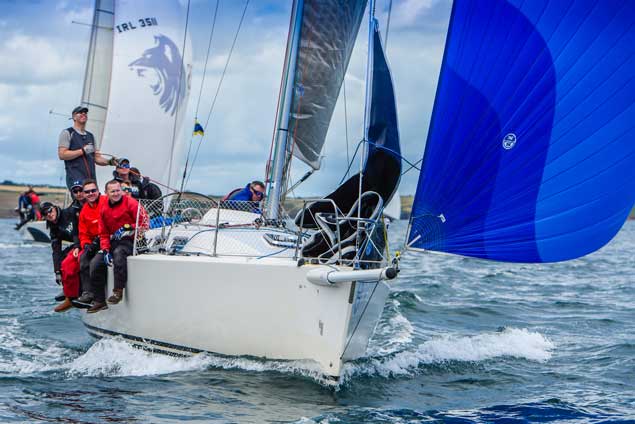 The Defence Forces’ crew, skippered by Commandant Barry Byrne and racing the J/109 Joker 2, were first winners of the Beaufort Cup which will continue as a feature of Volvo Cork Week in 2018. Photo Robert Bateman
The Defence Forces’ crew, skippered by Commandant Barry Byrne and racing the J/109 Joker 2, were first winners of the Beaufort Cup which will continue as a feature of Volvo Cork Week in 2018. Photo Robert Bateman
As it is, taking 12 highly competitive boats out of general competition impinged significantly on the mainstream Volvo Cork Week fleet in 2016, yet having the Beaufort Cup as part of Cork Week is something which adds to the allure of both events, so we sympathise with anyone who, in time, is going to have to square this particular circle. As it is, in 2018 the Beaufort Cup teams are going to be a fully-integrated part of Cork Week, racing the entire five days and savouring the unique Crosshaven Cork Week flavour, but nevertheless there are bound to be those who’ll wonder if extra mileage couldn’t be squeezed from having the Beaufort Cup as a standalone event.
As July veers into August, national sailing interest will swing two ways. Our potential Olympians will be shaping up for the intense contest at Aarhus in Dernmark, and at home in Ireland down in West Cork they’ll be shaping up for the allegedly non-intense Calves Week from Schull. In previewing the 2017 season, we described it as “a fun event with quite serious competitive undertones”, and this was then quoted with approval (and acknowledgement) by the Calves Week Chairman at a subsequent press launch, so if it ain’t broke, why try and fix it, Calves Week 2018 from 7th to 10th August (yes, four days, you’ll do more living in four days in West Cork than you will in a week elsewhere) definitely is a real fun event with quite serious competitive undertones.
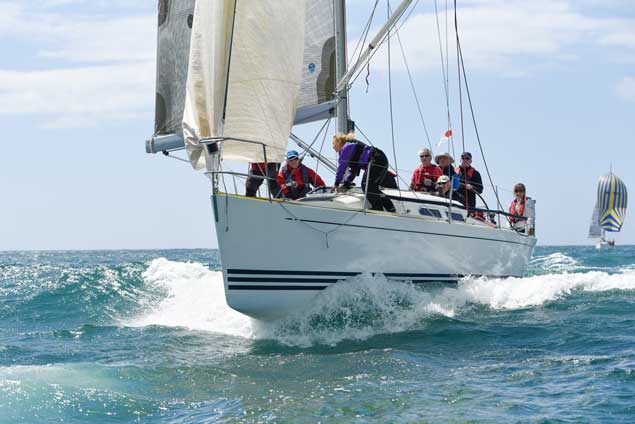 West Cork sailing at its glorious best – Calves Week action in August will be top of the bill in Schull. Photo: Robert Bateman
West Cork sailing at its glorious best – Calves Week action in August will be top of the bill in Schull. Photo: Robert Bateman
Back on the East Coast, meanwhile, the 1898-vintage Howth 17s are putting out the welcome mat on the weekend of August 10th to 12th for a Classics One-Design Regatta. It has been successfully done before with the Mermaids contributing much to the festivities, but this time the Young Gaffers of Howth hope that others – the Glens and Water Wags of Dun Laoghaire spring to mind – might also be interested. Certainly one of the unexpected successes of 2017 was the inclusion of a Classics Division in the Volvo Dun Laoghaire Regatta as part of the Bicentenary Celebrations for Dun Laoghaire Harbour, an idea which proved so popular there’s talk of doing it again in 2019, but it’s quite a challenge – getting venerable wooden boats and their characterful crews together is about as easy as herding cats.
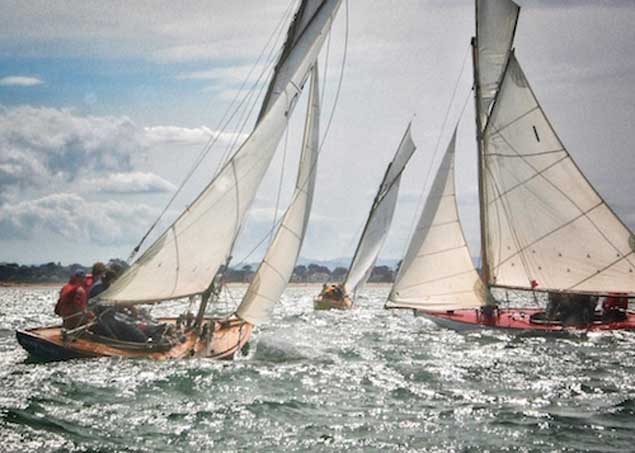 The 1898-vintage Howth 17s will be welcoming other classic One Designs to their home port on August 10th to 12th.
The 1898-vintage Howth 17s will be welcoming other classic One Designs to their home port on August 10th to 12th.
Normally August in a non-Fastnet year is a laid-back time for cruiser-racers when it’s possible to slip in one or two well-supported distance races in the Irish Sea, but August 2018 is going to be unprecedented, as both the WIORA Championship and the ICRA Nationals are going to be staged at Galway City from the 15th to the 18th of August.
Traditionalists will be ruffled by it being in August rather than June, and in the heart of the West Coast rather than at either end the old time-honoured basically Cork-Dublin axis. But ICRA Commodore Simon McGibney of Foynes and his team know that there is a strong core ownership of cruiser-racers along the length of the western seaboard (think of the 44 boats which turned out for the WIORA Championship in the Aran Islands at exactly the same time as the massive Volvo Dun Laoghaire Regatta 2017 was under way) and this fresh-look cruiser-racer gathering in Galway deserves every chance of success.
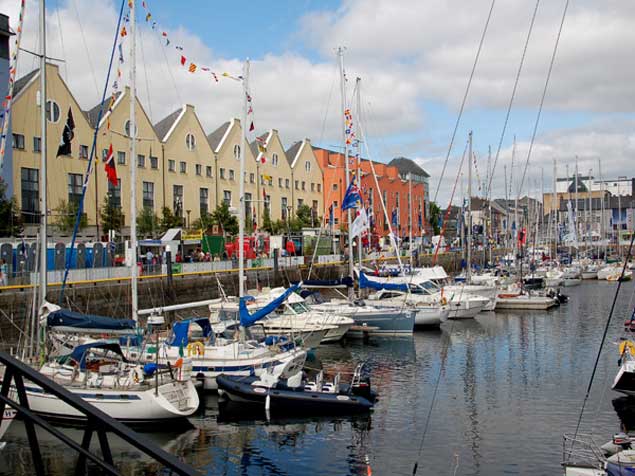 Regatta base in the hart of a hospitable city – Galway will be the hosting port for the WIORA Championship/ICRA Nationals 2018 from August 15th to 18th
Regatta base in the hart of a hospitable city – Galway will be the hosting port for the WIORA Championship/ICRA Nationals 2018 from August 15th to 18th
This preview of the cornucopia of events which 2018 has to offer is no more than a skimming of the peaks, with occasional in-depth glances at some curious corners of special interest. The sheer diversity of events, boats, locations and people involved is outlined in the detailed Irish Sailing schedule, and every sailor will find his or her favourite event there. But inevitably that detailed schedule is still far from complete. After all, in previewing 2016, even in January of that year we would not have been able to anticipate the huge success of the Beaufort Cup in July, for the then Minister for Defence Simon Coveney TD and his team didn’t have the inspired idea of the Beaufort Cup until late February.
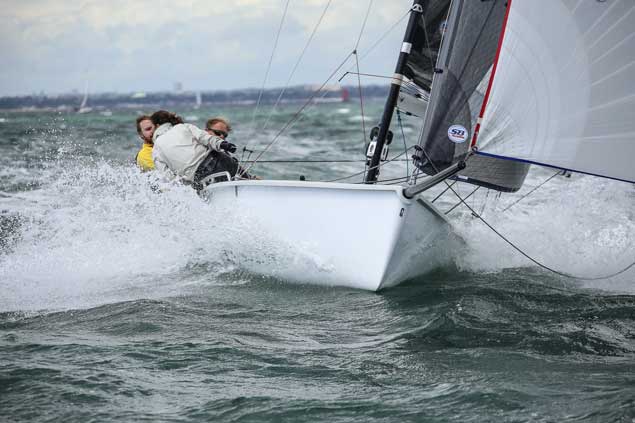 The SB20 Europeans promises some lively action on Dublin from August 28th – September 1st, at the Royal Irish Yacht Club hosted event Photo: David O'Brien/Afloat.ie
The SB20 Europeans promises some lively action on Dublin from August 28th – September 1st, at the Royal Irish Yacht Club hosted event Photo: David O'Brien/Afloat.ie
Nevertheless some things have been part of our sailing lives for decades, and every year September brings an entirely new mood, with established summer programmes drawing to a close, Autumn Leagues getting themselves into gear, and All-Ireland Championships to be raced.
The Juniors will be in the last weekend of September, venue and boat type still to be confirmed, but the Seniors are firmly in place at Lough Ree Yacht Club on the weekend of 13th to 14th October, to be raced in SB 20s.
There’s something very pleasing about the fact that the core stream of Irish sailing at home should reach its time-honoured concluding Championship of Champions in the heart of the country at a hospitable club which can trace its history back to 1770, with the event itself being raced in boats of a modern international class which has special Irish links. 2018 Irish sailing at home does indeed give every sign of being another memorable year, with a stylish and upbeat concluding championship.
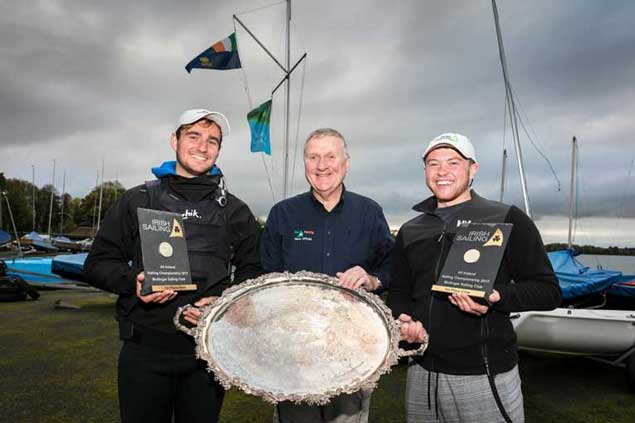 Fionn Lyden of Baltimore Sailing Club (left), with Irish Sailing President Jack Roy and crewman Liam Manning of Schull, and the historic All-Ireland silver salver he won on Lough Owel at Mullingar in October 2017. He will be defending at the All Irelands at Lough Ree on October 13th-14th 2018. Photo Irish Sailing
Fionn Lyden of Baltimore Sailing Club (left), with Irish Sailing President Jack Roy and crewman Liam Manning of Schull, and the historic All-Ireland silver salver he won on Lough Owel at Mullingar in October 2017. He will be defending at the All Irelands at Lough Ree on October 13th-14th 2018. Photo Irish Sailing
2018 SAILING HIGHLIGHTS
January Florida USA (Ft Lauderdale & Miami) – Olympic Classes Regattas
February 19th Antigua – RORC 600
March 12th Royal Cork YC - PY 1000
April 5th – 8th Irish Youth Pathway Nationals
April 21st ISORA season starts
May 25th – 29th Scottish Series, Tarbert
June 1-3rd Howth Regatta & Lambay Races
June 30th Volvo Round Ireland Race
July 16th-21st Volvo Cork Week with Beaufort Cup
July 30th – August 12th Hempel World Sailing Championship Aarhus, Denmark
August 7th-10th Calves Week, Schull
August 15th – 18th WIORA Championship & ICRA Nationals, Galway
August 28th – September 1st, SB20 Europeans, Royal Irish Yacht Club
September 7th – 15th September Laser Masters World Championships, RStGYC & NYC
September 29th-30th All Ireland Junior Championship (venue to be confirmed)
October 13th – 14th All Ireland Senior Championship, Lough Ree YC, sailed in SB20s


























